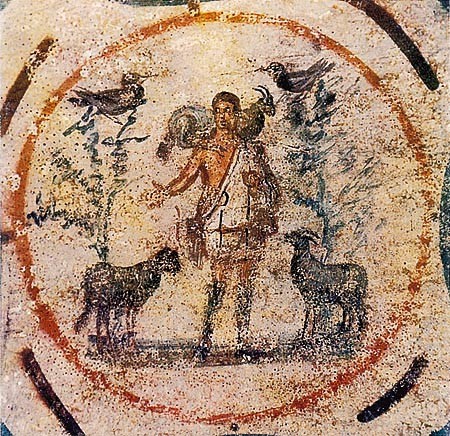Easter 4B (John 10:11-18; Psalm 23)
This is no voluntary association, no transactional contract. The sheep do not earn the shepherd or elect him.

The only sheep and shepherds to be seen in my urban neighborhood are either the subjects of cheerful pastel murals in church school classrooms or the children themselves, decked out as the inhabitants of Bethlehem for the Christmas pageant. So far removed are we from teeming, bleating sheepfolds that both the creatures and those who care for them seem little more than quaint artifacts. But we should not let ourselves be deceived by the seemingly mild metaphor of the Son of God in shepherd’s clothing.
Set dead center in John’s Gospel, Jesus’ claim to be “the good shepherd who lays down his life for the sheep” is a bold rejoinder to those who challenged his authority in the previous chapter. The claim focuses our attention on the one whose word will wake the dead and unbind an entombed Lazarus in the Gospel’s very next act. Evoking the figure of the shepherd in the hearing of first-century believers was more than pleasant peasant imagery: Moses was a shepherd, and so was King David. Ezekiel identified God’s action toward broken and scattered people as the work of a shepherd: “I will seek the lost, and I will bring back the strayed.”
Cloaked in simple shepherd’s garb, Jesus is proclaiming nothing less than the reign of God in our midst with every word and movement. Such boldness ought to trouble us, because these claims about Jesus’ identity and his relationship to the flock are also claims about us—about who we are, what we’re about and to whom we belong. They are also claims on us, and we are people who’ve been born and raised to resist ownership by others. That’s what’s going on, I suspect, when we paint this Good Shepherd bathed in soft light and keep him in a frame in the church hallway, or when we make this passage the occasion for reflection on the challenges of pastoral leadership. Either way, we try to manage our anxiety by seeking some self-fashioned shelter from the force of Jesus’ meaning, by domesticating the impact of the incarnation and denying its irresistible pull on our hearts and lives.
That this Shepherd is good should not lead us to assume that he is meek, tame or unobjectionable in the way that so much Christian art imagines, so much Christian preaching recommends and so much Christian living suggests. Rather, the Good Shepherd must be strong, resourceful and canny, enduring long days and nights in the wilderness as he accompanies the wandering flock and stays attuned to the well-being of his investment with tenacity and singleness of purpose.
In describing himself as a good shepherd, not a hireling or a thief, Jesus is not engaging in politics or polemics but is proclaiming the truth at the heart of the gospel: Christ’s very being enacts God’s relationship with the beloved creation, and is instigated not by us but by God. This is no voluntary association, no fair-weather friendship, no transactional contract. The sheep do not earn the Shepherd or elect him; nothing that we are or do can abrogate the relationship. We cannot stray or fall or fail in such a way as to be lost to God—ever—because we belong to God, “body and soul, in life and in death,” as the Heidelberg Catechism would remind us.
Lest we think that our belonging makes easy work of life or faith, that the Shepherd is in charge and so the flock can enjoy an extended field day, consider Jesus’ words: “I am the good shepherd. I know my own and my own know me.” To be Christ’s own, to move through the moments of our days, to craft our speech or care for our families or make choices about our economic lives as those who know and are known by God is neither comfortable nor without controversy, if Jesus’ own biography is any indication.
To complicate things further, we who understand ourselves to be in this relationship with the Good Shepherd must subject our self-importance and vested interests to the life and flourishing of the community from which our identity derives. Karl Barth said that there is no such thing as an individual Christian; in the English language, there is no separate singular form of the word sheep. In our essential belongingness, our being is bound up with the entire flock: with believers who break bread and recite prayers with us, and with those sheep whom Jesus knows and God sees, but whom we can scarcely bring ourselves to acknowledge and welcome, let alone live alongside or die to protect. This paradox illuminates the abundance in the life Jesus offers earlier in this tenth chapter of John: that as we recognize our belonging to God, the minutes of our lives are nothing less than a cup overflowing with goodness and mercy, and that as we live out our belonging, these lives which are not our own can set the table richly for others.





